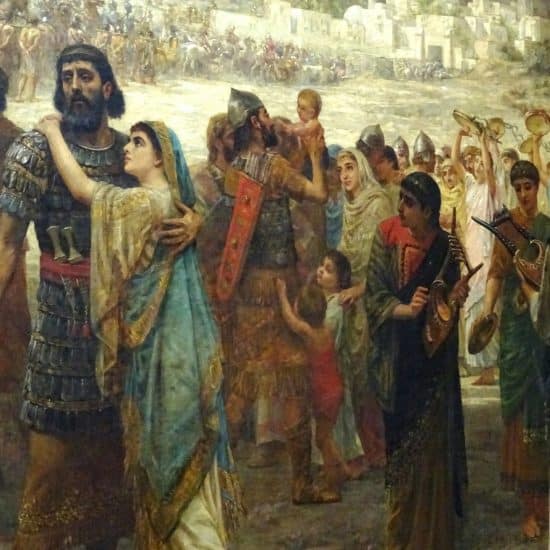 The Danites’ idolatry
The Danites’ idolatry
Formations: July 31, 2016
Scripture: Judges 18:14-31
 Michael OlmstedToday marks our fifth Sunday in the book of Judges and we are still not having fun! A couple of weeks ago someone in my Sunday School class asked, “When do we get to the positive part?” We have learned, unlike Israel, that God is not a “warrior god,” killing is not a way to lasting peace (Ehud), raiding and killing our enemies only perpetrate violence and fear (Deborah), religious oaths uttered to guarantee success only brings greater tragedy (Jephthah), and now, owning your own idol, place of worship and priest have nothing to do with God (Micah). Today’s story only takes us deeper into spiritual darkness, a tragedy that should turn our attention to Christ.
Michael OlmstedToday marks our fifth Sunday in the book of Judges and we are still not having fun! A couple of weeks ago someone in my Sunday School class asked, “When do we get to the positive part?” We have learned, unlike Israel, that God is not a “warrior god,” killing is not a way to lasting peace (Ehud), raiding and killing our enemies only perpetrate violence and fear (Deborah), religious oaths uttered to guarantee success only brings greater tragedy (Jephthah), and now, owning your own idol, place of worship and priest have nothing to do with God (Micah). Today’s story only takes us deeper into spiritual darkness, a tragedy that should turn our attention to Christ.
Our bookshelves are heavy with stories about violence and evil. Our movies are focused on drugs, war and the occult. Our news is crowded with racial conflict, genocide, economic problems and ugly politics. The world hasn’t changed much from day one. Our need and the answer remains the same: God’s love in Christ offers a new way to live. We don’t have to live in the world of Judges.
The last five chapters of Judges (17-21) are the darkest, not even hinting at a final heroic judge who will restore Israel to any semblance as God’s chosen people. We meet a man named Micah (not to be confused with the prophet of the same name) who lived in the hill country of Ephraim (Judges 17:1-18:13). Micah not only lacks any virtue, but is so selfish and immoral that he steals 1,100 pieces of silver from his mother. When his mother cursed him he returned the money and his mother dedicated 200 coins to God and had a silversmith craft them into a “sculpted image” and a “molded image” for her son. The Hebrew is not clear if this was one or two idols. Exodus 20:4-6 clearly forbids making any image of Yahweh or false gods. Remember the disaster that came from Aaron’s golden calf in Exodus 32:5?
Any time idols were allowed in the Promised Land the results were considerable. So Micah built a sanctuary (shrine) for this silver idol(s), made an ephod (a priestly garment used for divination) and set up teraphim (household gods connected to ancestor worship). He also ordained his own son a priest. The God of Abraham and Moses seems to have been forgotten. One day a Levite from Bethlehem came along and Micah offered him the job as priest with the incentive of “ten pieces of silver a year, a set of clothes and your basic needs” (Judges 17:10). What a bargain! As Micah explained, “Now I know that the Lord will give me good things because a Levite has become my priest” (v.13).
The dark story becomes even darker when some Danite warriors, on a par with bandits, showed up at Micah’s house of spiritual chicanery, saw the silver, went home to plot, then returned 600 strong to take everything. Micah’s priest saw beyond the problem to a new opportunity as priest for these Danites. Micah considered going after the robbers but realized they outnumbered his men. The Danites, now emboldened by their silver idol and priest, invaded the city of Laish in northern Canaan, killed all the inhabitants, burned down the city and built their new capital, Dan, named after themselves. As an additional claim to their heritage the Danites named Jonathan, son of Gershom and grandson of Moses, as their chief priest (Judges 18:30). This tale is a dark as any Hollywood movie currently showing.
Most of us get to this final story in Judges and wonder what happened to the new day, the dawning of hope to end the years of tragedy. Can we learn from these depressing stories? Are there parallels in our day to this man who believed he could build his own god, own his own priest and guarantee his own success? Have you read the papers or watched television lately? Are there any loud religious voices hocking prosperity theology, promising religious purity and a return to greatness, promoting division, military power and a return to leadership among the nations?
Religion may be used as a political tool, but faith in God is a life-changing force that offers healing of our brokenness, forgiveness of our sins, help for the suffering and light even when or world seems as dark as Micah’s. We continually struggle with two soul problems: selfishness and legalism. We see ourselves (me and mine) as the center of the universe. We can rule and decide who is right and deserving of the good life. We also know how to earn (deserve) God’s blessings and are quite capable of setting up the rules and appropriate rewards for the deserving. Welcome to the world of the judges!
Judges is more than a series of hapless tragedies. It reveals the depths of God’s compassion, his love and his grace. For all the darkness and despair, God never abandoned his plan to send his Son into our world. The Apostle Paul, an expert in the Law and the epic history of Israel, wrote the Colossian Christians: “God made you alive with Christ and forgave all the things you had done wrong. He canceled it by nailing it to the cross” (Colossians 2:14). He went on to warn them about the entanglements of rituals and legalism that can shut us off from God. Consider the history of Israel, the prophets, Temple, rituals, sacrifices and complex laws. None of these can substitute for personal faith in God and living out of that faith daily.
We have our modern idols and rituals which continually fail to give us peace or blessings. Do we dare to compare our attitudes and actions to Jesus, who cares for society’s outcasts, knows no racial barriers, never confines God to a magnificent temple and models forgiveness and generosity in the face of injustice and anger?
Judges is a graphic reminder that when we craft faith to serve our purposes, the result is tragedy and hopelessness. Yes, Judges is a tough read, but it can help us open our eyes and our heart to the hope of God’s grace – not in a religious system, but in Jesus, who became one of us, died in our place and took up life again for each of us.
Retired after 46 years in pastoral ministry, Michael K. Olmsted enjoys family, supply preaching and interim work, literature, history, the arts and antiques.
Formations is a curriculum series from Smyth & Helwys Publishing, Inc. through NextSunday Resources.
The PDF download requires the free Acrobat Reader program. It can be downloaded and installed at https://get.adobe.com/reader.



